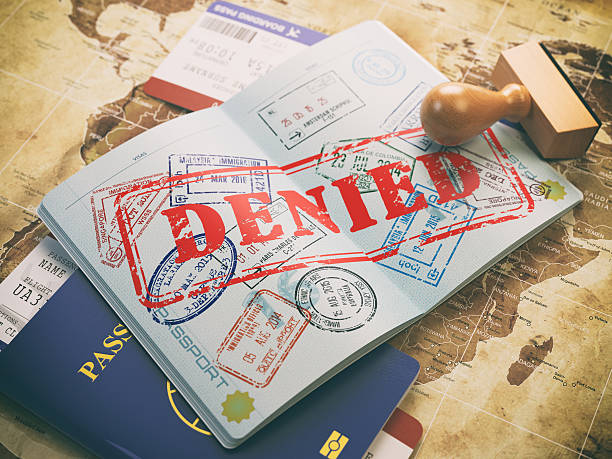Top 5 Countries with the Weakest Passports in 2025: Limited Global Access Explained
Not all passports are created equal. While some citizens enjoy virtually borderless travel, others face significant barriers. Let’s explore the world’s weakest passports and understand what this means for global mobility.

Introduction: The Passport Divide
I remember the first time I witnessed passport privilege in action. Standing in an international airport queue, I watched as travelers from certain countries breezed through immigration while others faced intense scrutiny, additional paperwork, and sometimes outright rejection. This stark contrast highlights one of travel’s uncomfortable truths: Your passport’s power significantly impacts your global mobility.
In 2025, passport inequality remains a pressing reality. While countries like Japan, Singapore, and Germany offer their citizens visa-free access to over 190 destinations, others provide access to fewer than 40 countries. This disparity creates a world where some travelers enjoy unprecedented freedom while others face constant barriers.
But which countries have the most restrictive passports? And what causes this limitation? Let’s dive into the five countries with the weakest passports in 2025 and explore what this means for their citizens.
What Makes a Passport “Weak”?
Before we unveil our list, let’s understand how passport strength is determined. The primary factor is the number of destinations a passport holder can access without a prior visa or through visa-on-arrival arrangements. Organizations like the Henley Passport Index rank passports based on this visa-free access, with higher numbers indicating stronger passports.
A weak passport typically results from several factors:
- Political instability or ongoing conflicts
- Limited diplomatic relations with other nations
- Economic challenges affecting international agreements
- Security concerns from receiving countries
- Historical tensions between nations
For citizens holding these passports, international travel involves lengthy visa applications, substantial documentation, high processing fees, and, unfortunately, high rejection rates.
The Top 5 Countries with the Weakest Passports in 2025
1. Afghanistan: The World’s Most Restricted Passport
Visa-Free Access: 26 destinations
Afghanistan consistently ranks at the bottom of global passport indexes. With access to only 26 destinations without prior visa arrangements, Afghan citizens face the most severe travel restrictions worldwide.
The country’s decades of conflict, political instability, and security concerns have created diplomatic isolation that directly impacts its citizens’ mobility. For Afghans, securing visas often involves extensive documentation, financial guarantees, and lengthy processing times—with no guarantee of approval.
Travel Options for Afghan Citizens: Despite these limitations, neighboring countries like Iran offer visa-free entry to Afghan citizens, providing opportunities to experience rich Persian culture and history without complex visa processes.
2. Syria: Diplomatic Isolation Reflected in Passport Power
Visa-Free Access: 29 destinations
Syria’s ongoing civil war has dramatically affected its international standing and, consequently, its passport strength. Syrian citizens can access just 29 destinations without advance visas, making international travel exceptionally challenging.
The humanitarian crisis and mass displacement have further complicated travel for Syrian nationals, with many countries implementing additional security checks and restrictions.
Travel Options for Syrian Citizens: Lebanon maintains relatively visa-friendly policies for Syrians due to historical ties and proximity, allowing access to its rich cultural heritage and Mediterranean coastline.
3. Iraq: Post-Conflict Mobility Challenges
Visa-Free Access: 30 destinations
Iraq’s passport restrictions reflect the country’s recent history of conflict and ongoing security concerns. Iraqi citizens have visa-free access to only 30 destinations, primarily consisting of nearby countries and nations with established diplomatic relations.
The complex geopolitical situation has resulted in stringent visa requirements, with many Western nations requiring extensive background checks and documentation.
Travel Options for Iraqi Citizens: Jordan offers simplified entry processes for Iraqi nationals, providing access to historical wonders like Petra and the Dead Sea without the usual visa complications.
4. Pakistan: Regional Tensions Affecting Global Mobility
Visa-Free Access: 32 destinations
Pakistan’s passport ranks fourth on our list, with visa-free access to 32 destinations. Regional political tensions, security concerns, and limited diplomatic outreach have contributed to these restrictions.
Pakistani travelers often face lengthy visa processes, with approval rates significantly lower than those of many other nationalities.
Travel Options for Pakistani Citizens: Malaysia provides simplified visa-on-arrival policies for Pakistani citizens, opening doors to its vibrant multicultural society, stunning landscapes, and modern cities like Kuala Lumpur.
5. Yemen: Conflict-Affected Mobility
Visa-Free Access: 33 destinations
Yemen completes our list with visa-free access to 33 destinations. The ongoing humanitarian crisis and civil conflict have severely impacted diplomatic relations, resulting in significant travel restrictions for Yemeni citizens.
Travel Options for Yemeni Citizens: Oman maintains neighborly ties with Yemen, allowing Yemeni citizens easier access to its stunning landscapes, traditional markets, and rich cultural heritage.
Comparing the World’s Weakest Passports
| Rank | Country | Visa-Free Destinations | Primary Limiting Factors |
| 1 | Afghanistan | 26 | Ongoing conflict, security concerns, limited diplomatic relations |
| 2 | Syria | 29 | Civil war, humanitarian crisis, international sanctions |
| 3 | Iraq | 30 | Post-conflict instability, security concerns |
| 4 | Pakistan | 32 | Regional tensions, security considerations |
| 5 | Yemen | 33 | Civil conflict, humanitarian crisis |
Challenges Faced by Weak Passport Holders
Having a passport with limited global access creates numerous challenges:
- Economic limitations: Restricted business and employment opportunities abroad
- Educational barriers: Difficulties accessing international educational institutions
- Family separation: Complications in visiting relatives in countries with strict visa requirements
- Higher travel costs: Expensive visa applications and potential rejection fees
- Time-consuming processes: Lengthy application procedures and waiting periods
- Psychological impact: The stress and uncertainty of visa rejections
These obstacles create a form of “passport apartheid,” where accidents of birth determine one’s freedom of movement across our increasingly interconnected world.
Can Weak Passport Holders Improve Their Global Mobility?
The good news is that there are strategies to enhance travel freedom despite holding a weak passport:
Dual Citizenship
Obtaining citizenship in a country with a stronger passport can dramatically increase travel freedom. This might be possible through:
- Ancestral connections
- Marriage
- Naturalization after residency
Citizenship-by-Investment Programs
Several countries offer pathways to citizenship through substantial investments:
- Caribbean nations like St. Kitts and Nevis or Dominica
- European options like Malta or Montenegro
- Turkey’s program offering access to 110+ countries
Professional Pathways
Certain professions and credentials can facilitate easier visa processes:
- Academic qualifications
- Business credentials
- Special talent visas
Are There Benefits to Holding a Weak Passport?
While the challenges are significant, some potential advantages exist:
- Lower international scrutiny in certain situations
- Stronger regional connections with neighboring countries
- Development of resilience and problem-solving skills through navigating complex systems
- Appreciation for travel opportunities when they arise
The Future of Passport Strength: Can Weak Passports Improve?
History shows that passport strength isn’t static. As countries stabilize politically and economically or improve diplomatic relations, their passport power can increase substantially.
Examples of improvement include:
- The United Arab Emirates, which has dramatically strengthened its passport over the past decade
- Serbia’s increased global access following improved European relations
- Colombia’s passport strength growth after enhanced security and economic development
For the five countries on our list, improvements would likely follow political stability, economic development, and expanded diplomatic engagement.
Conclusion: Beyond Passport Inequality
The stark reality of passport inequality highlights how geopolitics directly impacts individual lives. While citizens of powerful passport nations may take their travel freedom for granted, millions navigate a world of barriers and restrictions based solely on their country of origin.
Understanding these disparities helps create awareness about global mobility challenges and potentially drives conversations about more equitable travel systems. For travelers from privileged passport backgrounds, this knowledge fosters appreciation for the freedom many take for granted.
If you’re planning international travel—regardless of your passport strength—research destination requirements thoroughly and prepare documentation well in advance. And if you’re fortunate enough to hold a strong passport, perhaps take a moment to appreciate the privilege of relatively borderless travel.
Have you experienced challenges traveling with a restricted passport? Or have you witnessed passport inequality firsthand? Share your experiences in the comments below!


